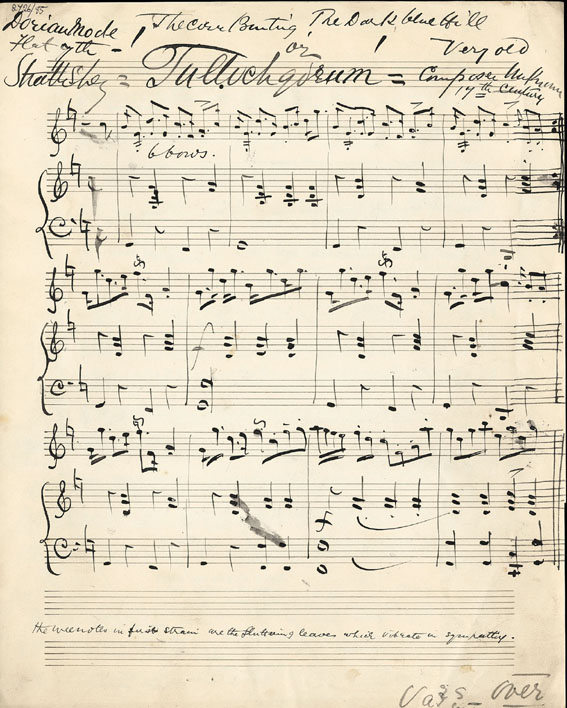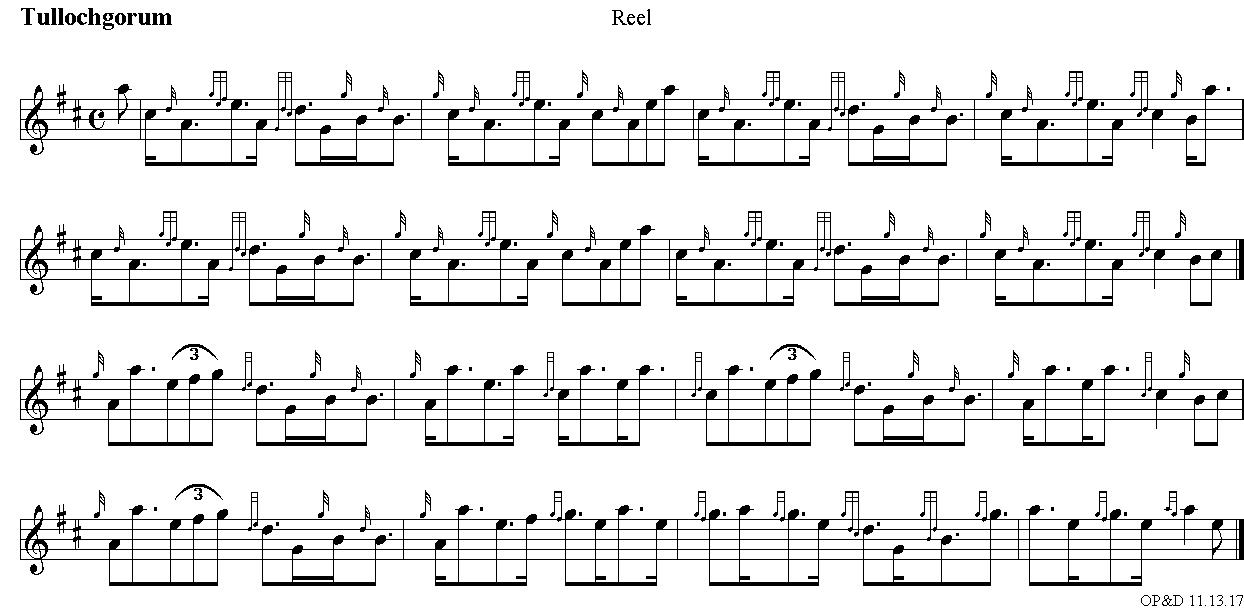 |
||||||||||||||||||||||||||||||||||||||||||||||||||||||||||||||||||||||||||||||

Best viewed in
|
|
|||||||||||||||||||||||||||||||||||||||||||||||||||||||||||||||||||||||||||||
|
Rev. William Reid provides the following explanation of the title, but its authority is compromised by the romantic and sentimental imagery of the plot and the lack of evidence cited:
[O]nly a few miles from Grantown is situated Tullochgorum, the scene of the bloody tragedy which inspired the reel of the same name. … [H]ere is to be found the farm-house of Tullochgorum. … Two hundred years ago among the suitors for the hand of the Laird’s daughter, Isabel, was one of the lawless clan Macgregor, but her friends gave the preference to a gentleman of the Robertson clan, who resolved on the destruction of his rival. Accordingly, accompanied by a small party, he came suddenly upon him, but Macgregor was more than a match for his assailants. Having escaped to a barn he made a gallant use of his claymore, striking down successively those who dared to enter, and aided by Isabel, who loaded for him a musket, he succeeded in destroying the whole band, among whom was her brother, who had acted a treacherous part on the occasion. It was in the moment of exultation consequent in such a victory that he composed and danced the famous reel of Tullochgorum.
While the origins of the tune, ‘Tullochgorum,’ are unclear, it is likely that it originated in the Highlands of Scotland. The tune assumed an especially high cultural value when the Reverend John Skinner wrote Scots lyrics to it (c. 1760). The Rev. Skinner (1721-1807) was born at Balfour, Aberdeenshire; the son of the schoolmaster of Birse. He was educated at Marischal College, Aberdeen, became assistant schoolmaster at Monymusk, took orders in the Scottish Episcopal Church in 1742, spent two years in Shetland as preceptor in the family of the Sinclairs of Scalloway, then, returning to Aberdeen, ministered at Longside, near Linshart, for the rest of his life. The Reverend John Skinner was the author of several popular Scotch poems and songs. The list includes ‘John o’ Badenyon’ and ‘Ewie wi’ the Crookit Horn’. The lyrics combine Highland Scottish, Lowland Scottish, and British identities with a message of unification – reference to a ‘Highland taste’ in a song written in Lowland Scots rather than Gaelic highlights an interface between the two cultures, and while there is no explicit reference to British identity, the lack of antagonism towards England arguably implies an, at least latent, accord. At the same time, the lyrics criticize ‘foreign’ influences, whether musical, as in ‘dull Italian lays’, or political, as in ‘the ills that come frae France’. Skinner’s position as an Episcopalian minister and an influential figure within the Scottish Episcopal Church is one possible explanation of the fervent nationalism evoked in the song: his decision to convert from Church of Scotland to Scottish Episcopal Church and worship according to the liturgy of the Church of England was undoubtedly a very significant decision and one which must have shaped his own sense of identity. The fact that the song went on to become so popular may be explained both by the public’s familiarity with the tune and by their ability to relate to the words in a climate of cultural nationalism. A reference to the tune by name in an 1809 biographical account of the famous eighteenth-century fiddler, Niel Gow (the only tune to be referred to by name in the whole article), demonstrates its centrality to Scottish fiddle music and, by the fact that the biographical account was published in the widely circulated Scots Magazine, Scottish culture in general.
Lyrics by Rev. John Skinner
|
||||||||||||||||||||||||||||||||||||||||||||||||||||||||||||||||||||||||||||||

